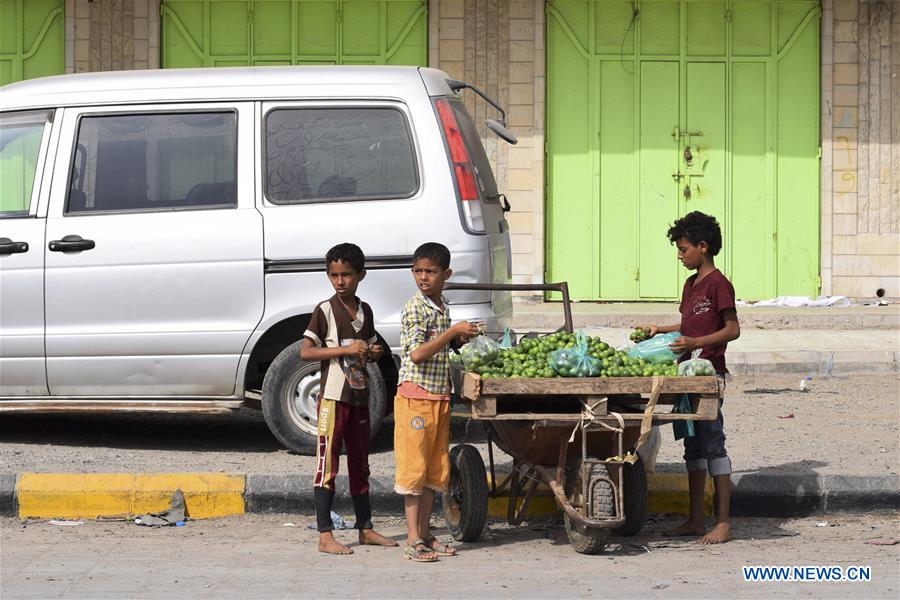
Children sell lemons on a street in Aden, Yemen, March 8, 2019. Thousands of Yemeni children have been pushed into the streets as a result of growing military conflict that broke out between Yemen's government forces and the Houthi rebels in 2015. The number of street children is still increasing on a daily basis as fighting continues, expanding to include more provinces in the impoverished Arab country amid lack of political solutions to end the four-year civil war. (Xinhua/Murad Abdo)
by Murad Abdo
ADEN, Yemen, March 8 (Xinhua) -- Thousands of Yemeni children have been pushed into the streets as a result of growing military conflict that broke out between Yemen's government forces and the Houthi rebels in 2015.
The number of street children is still increasing on a daily basis as fighting continues, expanding to include more provinces in the impoverished Arab country amid lack of political solutions to end the four-year civil war.
Government-controlled provinces including the southern port city of Aden, Yemen's temporary capital, turned to be the first destination for thousands of children fleeing their hometowns devastated by war and famine.
Every day, ten-year-old Ahmed leaves his displacement camp located on the outskirts of Aden and heads to the main streets in the city begging for food or money from passing shoppers and car drivers, just like thousands of his peers who are living in poverty.
"After losing a number of my family members including my father, I left along with my mother and three sisters to Aden and I'm trying to do everything to get money for survival," Ahmed Ayad said, who spends most of his time in the streets.
With his dirty dress that seems to have not been changed in days, Ahmed endures spending too much time under the burning sun in Aden's streets struggling with hope to gain the cost of meals for his family.
"Sometimes I succeed and get money through begging in the streets and most of the times I fail because most of the people are poor and they have nothing to offer," Ahmed said, as he was sitting on the pavement having a short break.
The ongoing war led to a devastating impact on children's education. As many as two million Yemeni children are out of school and have a "very limited" opportunity to return to education.
According to reports revealed by the United Nation, every one in five schools have been damaged, destroyed or used as shelters or for military purposes in Yemen.
Marwan Yaser, nine years old, is a victim of violence and civil war that largely affected the education sector in Yemen, driving thousands of children either into early military recruitment or going to the streets.
"I lost hope in education after seeing my schools closed and militiamen started using our classrooms as caches for arms and landmines," Marwan said.
After leaving his primary school, Marwan joined a number of his friends and started taking his new lessons in street begging in addition to his work as a street vendor two days a week.
'War forced me to work in begging most of the time and only two days I work as a street vendor just for the purpose of collecting money because no one will feed me," he said.
Other Yemeni children, who fled their war-ravaged areas in the northern part of the country that's controlled by the Houthi rebels, were pushed into the workforce early to provide their displaced families with basic supplies.
A number of children were seen roaming the main streets in Aden's neighborhood Sheikh Othman after their failure to get work opportunities even in carpentry or restaurants.
"I have been looking for work since my arrival here two months ago but all restaurant owners refused to accept me to work as a waiter even with a very little salary," said Sadiq Mohamed, 13, who is washing cars for a living.
It was highly hoped that Stockholm's agreement on the strategic Red Sea port city of Hodeidah can pave the way for permanent peace in the impoverished Arab country as the first step to end the four-year military conflict.
However, all the provisions of Stockholm's agreement were not implemented on-ground and both Yemeni warring parties failed to withdraw their forces from the city's ports and surrounding outskirts but continued to prepare for new military escalation.
Yemeni observers expected that failure in implementing the Stockholm agreement on Hodeidah will open the door broader for a resumption of military operations between the two warring rivals during the upcoming weeks.
The impoverished Arab country has been locked into a civil war since the Iran-backed Shiite Houthi rebels overran much of the country militarily and seized all northern provinces, including the capital Sanaa, in 2014.
Saudi Arabia leads an Arab military coalition that intervened in Yemen in 2015 to support the government of President Abd-Rabbu Mansour Hadi after Houthi rebels forced him into exile.
The internal military conflict between the Iranian-backed Houthis and the Saudi-backed Yemeni government has entered its fourth year, aggravating the suffering of Yemenis and deepening the already world's worst humanitarian crisis.















